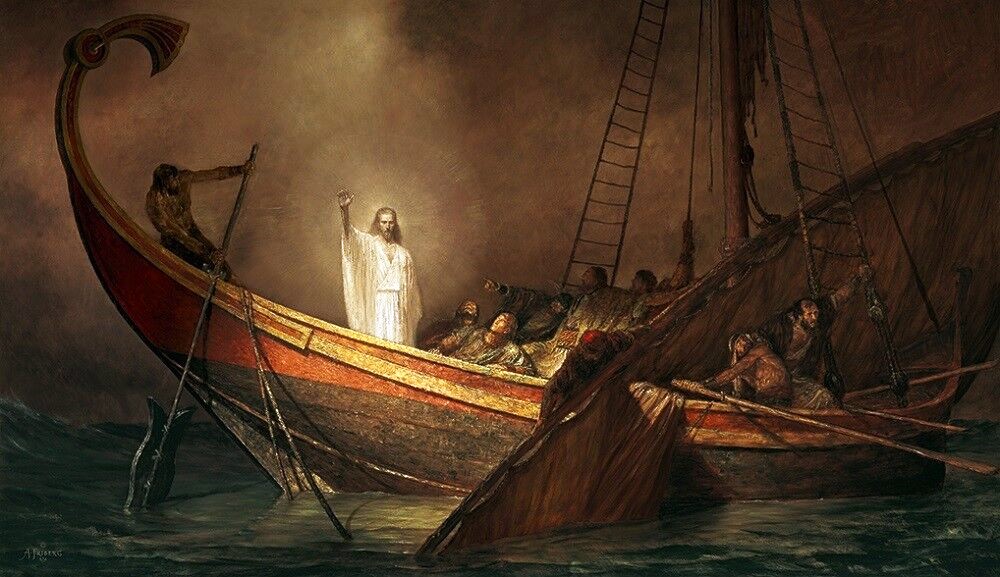Translation of the Holy Gospel According to Matthew
At that time, when Jesus entered into the boat, His disciples followed Him: and behold a great tempest arose in the sea, so that the boat was covered with waves, but He was asleep. And His disciples came to Him and awoke Him, saying: Lord, save us, we perish. And Jesus saith to them: Why are you fearful, O ye of little faith? Then rising up, He commanded the winds and the sea, and there came a great calm. But the men wondered, saying: What manner of man is this, for the winds and the sea obey him?
From Pope Pius X’s Encyclical Iucunda Sane, 1904.
It is painful to have to apply to men not lacking in acumen and application the rebuke addressed by St. Paul to those who fail to rise from earthly things to the things that are invisible: They became vain in their thoughts and their foolish heart was darkened; for professing themselves to be wise they became fools (Rm 1,21-22). And surely foolish is the only name for him who consumes all his intellectual forces in building upon sand.
Not less deplorable are the injuries which accrue from this negation to the moral life of individuals and of civil society. Take away the principle that there is anything divine outside this visible world, and you take away all check upon unbridled passions even of the lowest and most shameful kind, and the minds that become slaves to them riot in disorders of every species. God gave them up to the desires of their heart, unto uncleanness, to dishonor their own bodies among themselves (Rm 1,24). You are well aware how truly the plague of depravity triumphs on all sides… they proclaim the right to act as they please… Take away God, and all respect for civil laws, all regard for even the most necessary institutions disappears… and men go so far as to destroy the very structure of the family, which is the first and firmest foundation of the social structure…
Yet there is no salvation for the world but in Christ: For there is no other name under heaven given to men whereby we may be saved (Ac 4,12). To Christ then we must return. At His feet we must prostrate ourselves to hear from His divine mouth the words of eternal life, for He alone can show us the way of regeneration, He alone teaches us the truth, He alone restores life to us. It is He who has said: I am the way, the truth, and the life (Jn 14,16)… Jesus remains for ever the cornerstone of human society, and again the truth becomes apparent that without Him there is no salvation: This is the stone which has been rejected by you, the builders, and which has become the head of the corner, neither is there salvation in any other (Ac 4,11-12).
…We must, above all else, have recourse to prayer, both public and private, to implore the mercies of the Lord and His powerful assistance. Lord, save us–we perish (Mt 8,25), we must repeat like the Apostles when buffeted by the storm.
But this is not enough. St. Gregory rebukes the bishop who, through love of spiritual solitude and prayer, fails to go out into the battlefield to combat strenuously for the cause of the Lord: The name of bishop, which he bears, is an empty one….It is still more necessary to inculcate properly on the minds of all the moral maxims taught by Jesus Christ, so that everybody may learn to conquer himself, to curb the passions of the mind, to stifle pride, to live in obedience to authority, to love justice, to show charity towards all, to temper with Christian love the bitterness of social inequalities, to detach the heart from the goods of the world, to live contented with the state in which Providence has placed us, while striving to better it by the fulfillment of our duties, to thirst after the future life in the hope of eternal reward. But, above all, is it necessary that these principles be instilled and made to penetrate into the heart, so that true and solid piety may strike root there, and all, both as men and as Christians, may recognize by their acts, as well as by their words, the duties of their state and have recourse with filial confidence to the Church and her ministers to obtain from them pardon for their sins, to receive the strengthening grace of the Sacraments, and to regulate their lives according to the laws of Christianity.
..To the exercise of this charity let us dedicate ourselves wholly; let all our own affairs give way before it, let our personal interests and convenience be set aside for it, making ourselves all things to all men (1Co 9,22), to gain all men to the Lord, giving up our very life itself, after the example of Christ: The good shepherd gives his life for his sheep (Jn 10,11).

